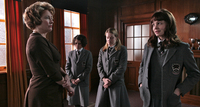
The first day of the Toronto International Film Festival is usually very lightly programmed, presumably so that other films are neither competing with nor overshadowed by the opening night gala. The prestigious first Thursday slot at the Roy Thompson Hall was given to the Charles Darwin biopic, Creation, starring Paul Bettany and Jennifer Connelly. If you’re anxious enough to get to Toronto on the first day but not quite ready to spring for tickets to walk the red carpet, your best bet is usually the Ryerson theater which will generally have a premiere of an anticipated, studio-backed film–something capable of selling out one of the larger venues without overshadowing a marquee event. (If the adrenaline has really got you going, the first midnight madness show is usually a film with a tad more name recognition. This year, Karyn Kusama’s Jennifer’s Body got the nod.)
Lone Scherfig’s An Education is just the sort of film that makes for a great first evening screening. A British university comedy and bildungsroman, it can be marketed with several familiar faces: Alfred Molina, Peter Sarsgaard, and (in a small role) Emma Thompson.
The name on the credits that is drawing everyone’s attention, however, is the screenwriter’s. As someone who counts High Fidelity among his ten favorite films of all time–and who has read enough of Nick Hornby’s novels to know that the best parts of that film are lifted nearly verbatim from the pages of its source material–I approached An Education with the quiet confidence that, even though I had never seen one of Scherfig’s previous films, I was in good hands.
An Education is more than just a great script, though. Alternately foot-stompingly funny, desperately painful, and achingly tender, it is a reminder after scores of sitcom love triangles of just how deeply affecting a love story can be. It is also a coming of age story about a young woman longing every bit as deeply for a sense of purpose to her life as she is for a romantic love affair. Just as High Fidelity showed how music can be used as a kind of drug to assuage a deep melancholy over doubts about life’s purpose and meaning, so too does An Eduction contrast the allure of surface pleasures (some of them intellectual and aesthetic as well as sensual) against the seeming emptiness of a responsible life that the postmodern world can no longer convince itself is a means to an end any different from what the hedonists will suffer (and that after having a lot more fun).
One thing that makes a Hornby story so distinctive is that he doesn’t stack the deck–for either the conventional mainstream wisdom or the unconventional upstart. When the conflict doesn’t have an obvious right choice–or even when it does but we can see both positives and negatives resulting from it–we can empathize more deeply with the protagonist than we can with most romantic protagonists who are simply obtusely blind to what is apparent to the audience much earlier.
Olivia Williams, Peter Sarsgaard, and Carey Mulligan all give note perfect performances. (The latter mentioned in the Q&A that she will be in the forthcoming adaptation of Kazuo Ishiguro’s Never Let Me Go.)
Some conservative viewers will likely be put off by the film’s unwillingness to be reflexively critical of the sexual relationship between the two principals–she is sixteen when they meet, and there is plenty of smoking and drinking. So the content and several of the situations are “R” rated by nature, even if the presentation of them is more PG-13.
Guest blogger Kenneth R. Morefield, an English prof at Campbell University, is writing about the Toronto International Film Festival for CT Movies.







